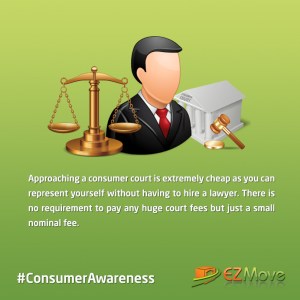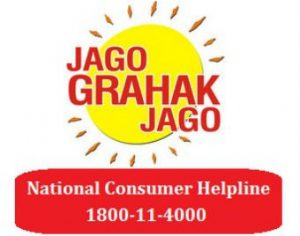Is Consumer Protection Act making consumer a king?
 Consumerism promotes both social as well as economic conditions which encourages the buying of goods and services in ever-greater amounts. And, consumerism implies better economy of a nation. The term refers to the consumer protection which seeks to defend and inform consumers to be informed of practices as honest advertising and packaging, product guarantees, fair price, and enhanced standards of safety. In this regard it is a movement or an array of policies having a mission of regulating the products, methods, services, and standards of sellers, manufacturers and advertisers in the buyers’ interests. As per economics definition, consumerism means economic policies of laying importance on consumption. In a sense, it is believed that the consumers are free to make choice and should dictate the society’s economic structure. The term “consumerism” had been first used in the year 1915 and referred to “advocacy of the rights and interests of consumers” defined in Oxford English Dictionary. Consumer protection plays a crucial role in building a fairer, safer world.
Consumerism promotes both social as well as economic conditions which encourages the buying of goods and services in ever-greater amounts. And, consumerism implies better economy of a nation. The term refers to the consumer protection which seeks to defend and inform consumers to be informed of practices as honest advertising and packaging, product guarantees, fair price, and enhanced standards of safety. In this regard it is a movement or an array of policies having a mission of regulating the products, methods, services, and standards of sellers, manufacturers and advertisers in the buyers’ interests. As per economics definition, consumerism means economic policies of laying importance on consumption. In a sense, it is believed that the consumers are free to make choice and should dictate the society’s economic structure. The term “consumerism” had been first used in the year 1915 and referred to “advocacy of the rights and interests of consumers” defined in Oxford English Dictionary. Consumer protection plays a crucial role in building a fairer, safer world.
In the developing countries, consumers are yet to grow to be mature in their decision making. Consumers need to think seriously regarding their requirements. Most of the products are purchased by the consumers based on herd mentality; if neighbors buy something, or friends buy then even I want to buy. Also, there are many products in the market that signifies the status symbol like food processor, microwave, home theatre, dining tables etc and the consumers are ready to purchase these products even without having much demand. Some life-events influence consumer behavior; these life events which otherwise can be rationally handled; need, arousal, information, search need to be evaluated while looking at alternatives which does not happen.
In India there are strong and clear laws to defend consumer rights. Out of the various laws that have been enforced to protect the consumer rights in India, the most important is the Consumer Protection Act, 1986. According to this law, everybody, including individuals, a firm, a Hindu undivided family and a company, have the right to exercise their consumer rights for the purchase of goods and services made by them. It is noteworthy that, as consumer, one knows the basic rights as well as about the courts and procedures that follow with the infringement of one’s rights.
In general, the consumer rights in India are listed below:
- The right to be protected from all kind of hazardous goods and services: Goods or services that can be proved hazardous to the safety or life of a person offered for sale, unknowingly or knowingly, that cause injury to health, safety or life. According to the Consumer Protection Act 1986, the consumer right is referred to as ‘right to be protected against marketing of goods and services which are hazardous to life and property’. It is applicable to specific areas like healthcare, pharmaceuticals and food processing; this right is spread across the domain having a serious effect on the health of the consumers or their well being viz. Automobiles, Housing, Domestic Appliances, and Travel etc. When there is violation of the right then there occur medical malpractice lawsuits in the country. It is estimated every year that thousands or millions of citizens of India are killed or seriously injured by immoral practices by doctors, hospitals, pharmacies and the automobile industry. Still the government of India, known for its callousness, does not succeed in acknowledging this fact or making a feeble effort for maintaining statistics of the mishaps
- The right to be fully informed about the performance and quality of all goods and services: The right to information is defined as ‘the right to be informed about the quality, quantity, potency, purity, standard and price of goods or services, as the case may be so as to protect the consumer against unfair trade practices’ in the Consumer Protection Act of 1986. In the market place of India, consumers get information by two ways namely advertising and word of mouth however these sources are considered to be unreliable but still this word of mouth is quite common here. Because of this, the Indian consumers hardly have precise and complete information for assessing the true value, safety, suitability, reliability of any product. Usually the hidden costs can be found, lack of suitability, quality problems and safety hazards only after the purchase of the product.
- The right to free choice of goods and services.
- The right to be heard in all decision-making processes related to consumer interests.
- The right to seek redressal, whenever consumer rights have been infringed.
- The right to complete consumer education.
 The Consumer Protection Act, 1986 and several other laws like the Weights, Standards & Measures Act need be formulated further to make sure that there is fair competition in the market and free flow of correct information from goods and services providers to the ones who consume them. In fact, the degree of consumer protection in any country is regarded as the rightly gauged which accelerates progress of the country. There is high level of sophistication gained by the goods and services providers in their marketing and selling practices and different types of promotional tasks viz. advertising resulted in an increasing requirement for more consumer awareness and protection. The government of India has realized the condition of Indian consumers therefore the Ministry of Consumer Affairs, Food and Public Distribution has incorporated the Department of Consumer Affairs as the nodal organization to protect the consumer rights, redress the consumer grievances and promote the standards governing goods and services provided in India.
The Consumer Protection Act, 1986 and several other laws like the Weights, Standards & Measures Act need be formulated further to make sure that there is fair competition in the market and free flow of correct information from goods and services providers to the ones who consume them. In fact, the degree of consumer protection in any country is regarded as the rightly gauged which accelerates progress of the country. There is high level of sophistication gained by the goods and services providers in their marketing and selling practices and different types of promotional tasks viz. advertising resulted in an increasing requirement for more consumer awareness and protection. The government of India has realized the condition of Indian consumers therefore the Ministry of Consumer Affairs, Food and Public Distribution has incorporated the Department of Consumer Affairs as the nodal organization to protect the consumer rights, redress the consumer grievances and promote the standards governing goods and services provided in India.
If there is infringement of rights of consumer then a complaint can be made under the following circumstances and reported to the close by designated consumer court:
- The goods or services purchased by a person or agreed to be purchased by a person has one or more defects or deficiencies in any respect.
- A trader or a service provider resorts to unfair or restrictive practices of trade.
- A trader or a service provider if charges a price more than the price displayed on the goods or the price that was agreed upon between the parties or the price that was stipulated under any law that exist.
Consumers International (CI), the global federation of consumer organisations, set out to consider the state of consumer protection around the world through a global survey of its member organisations. Seventy consumer groups from 58 countries participated in this research, which covers a wide range of consumer protection issues. The results provide an discerning global snapshot of consumer protection across a wide spectrum of countries, and an invaluable contribution to CI’s work on consumer justice and protection. The results of this survey also come at an important time in the ongoing international development of consumer protection. The key principles of consumer safety were initially being protected at an international level in the UN Guidelines for Consumer Protection (UNGCP). Since being established in 1985, the UNGCP now forms the basis of consumer protection legislation in many countries around the world. CI and its member organisations are contributing to this process to ensure that the guidelines are revised to reflect the reality faced by consumers in the 21st Century.
 Conclusion: While the business world is experiencing the how consumerism is changing the way the world shops because of the consumer’s ability to get information about whatever he wants, whenever he wants and this power has given the consumer an unprecedented strength. In markets with highly transparent prices, they are kings. And we see highly transparent markets only in developed countries. The implications for business are colossal; threatening for some and welcoming for others. For instance, the huge increase in choice makes certain brands more valuable, while some lose their value. And as old business divisions crumble, a strong brand in one sector can kill other brand’s potential. Look at how Apple has used its iPod to take away business for portable music players from Sony; Starbucks is aiming to become a big noise in the music business by installing CD-burners in its cafés; and Dell is moving from computers into consumer electronics.
Conclusion: While the business world is experiencing the how consumerism is changing the way the world shops because of the consumer’s ability to get information about whatever he wants, whenever he wants and this power has given the consumer an unprecedented strength. In markets with highly transparent prices, they are kings. And we see highly transparent markets only in developed countries. The implications for business are colossal; threatening for some and welcoming for others. For instance, the huge increase in choice makes certain brands more valuable, while some lose their value. And as old business divisions crumble, a strong brand in one sector can kill other brand’s potential. Look at how Apple has used its iPod to take away business for portable music players from Sony; Starbucks is aiming to become a big noise in the music business by installing CD-burners in its cafés; and Dell is moving from computers into consumer electronics.













































